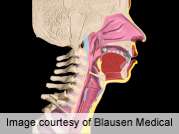For post-radiotherapy survivors of head and neck cancer, depression is fairly common, but treatment is underutilized, according to research published online Aug. 15 in JAMA Otolaryngology-Head & Neck Surgery.
(HealthDay)—For post-radiotherapy survivors of head and neck cancer, depression is fairly common, but treatment is underutilized, according to research published online Aug. 15 in JAMA Otolaryngology-Head & Neck Surgery.
Allen M. Chen, M.D., from the University of California in Davis, and colleagues conducted a cross-sectional analysis involving 211 patients with squamous cell carcinoma of the head and neck, who had been previously treated with radiotherapy, to determine the prevalence of self-reported depression. Rates of depression were analyzed using the self-administered University of Washington Quality of Life Instrument.
The researchers observed no difference in the mean mood score at one, three, and five years after treatment. At one, three, and five years, respectively, 17, 15, and 13 percent of patients reported their mood as somewhat or extremely depressed. The presence of tracheostomy tube or laryngeal stoma, gastrostomy tube dependence, and continued smoking at follow-up correlated significantly with post-radiotherapy depression. At one, three, and five years of follow-up, the proportion of those who were somewhat or extremely depressed and were using antidepressants was 6, 11, and 0 percent, respectively, while 3, 6, and 0 percent, respectively, were actively undergoing psychotherapy and/or counseling.
"Despite a relatively high rate of depression among patients with head and neck cancer in the post-radiotherapy setting, mental health services are severely underutilized," the authors write.
More information:
Abstract
Full Text (subscription or payment may be required)
Copyright © 2013 HealthDay. All rights reserved.





















